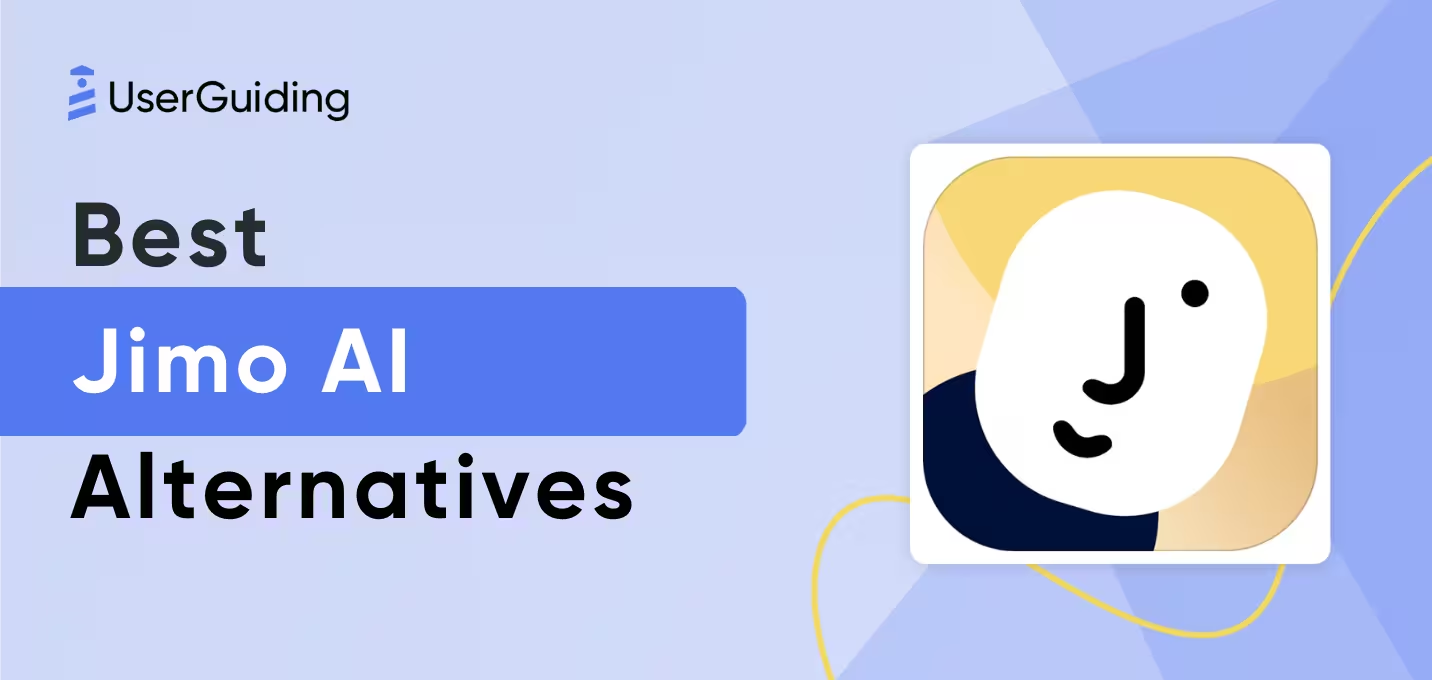

Videos are perfect for drawing attention and keeping that drawn attention.
Especially when compared to written content, videos are much more catchy and should be adopted when possible.
When welcoming new users or employees to a platform, educating them on the uses of a product, and introducing new elements; companies use videos and achieve great results.
91% of people said they have watched a video to understand how to use a product better.
There is a high demand among customers that you diversify the medium that you use when creating content. Some people like to read, some like to listen, and some like to watch. In order to satisfy this desire of customers, you should make use of written content, videos, and podcasts.
When it comes to onboarding, your onboarding should be interactive, and the two best ways to achieve that are to use interactive guides and video guides.
In this article, I will share some of the best practices for customer onboarding videos to get your onboarding process up and running.
Let’s take it from the video onboarding meaning.
What is an Onboarding Video?
Onboarding videos show the core functions and the value proposition of your product and company. They are very helpful in the user onboarding flows. Using video content is highly useful for introducing your product or brand to your prospects. It welcomes new customers and employees and educates them about your product or service. These mostly include instructional or welcoming videos, a way of giving a “welcome on board” message to newcomers.
Onboarding videos can be used to:
- Demonstrate and explain a product, service, concept, brand, company, or message,
- Educate new users and inspire prospects to purchase your product,
- Support, inform, and train customers to provide the best user experience for them,
- Attract new customers,
- Improve customer and employee retention.
Video onboarding lays a strong foundation for long-term relationships with customers and employees. Investing in a high-quality customer onboarding video can provide a high ROI (return on investment.) Given that video content is more likely to grab attention, it helps you maximize customer and employee retention.

Why Use Video for Onboarding?
Videos are a great way to directly illustrate your value, as you show them instead of telling them about it.
People are already gravitating towards videos to learn how products work and understand product features, rather than online user manuals. We can put forth Youtube, the largest video hosting platform on earth, as a case in point.
“How to” videos are among the top four content categories on YouTube. It is crystal clear to see why informative videos produce more engagement and a next-level value. They deliver the information users are looking for in a capsule; they keep it short and engaging.
But wait, there’s more.
According to a study, watching a brand’s video has led 8 out of 10 people to purchase software or an app.
It sounds quite impressive, doesn’t it?
Today, more and more companies shift towards onboarding videos in their marketing and employee engagement strategies. Speaking of which, now that you got the video onboarding meaning let’s take a closer look at the ‘why’ part. Here’s why videos make your customer onboarding process stupendously more effective:
Educating New Users
97% of people agree that video content is efficient in welcoming and educating new users.
Videos can explain even the most complex ideas quickly and simply. You must know your product like the back of your hand, but when it comes to onboarding, put yourself in new users’ shoes.
Video content is a powerful solution to educate the new users who see your product or service for the first time. Plus, it is always more engaging than reading long, long, long texts.
Onboarding Employees
For employee onboarding, onboarding videos can be useful for hyping them up and getting their orientation right with the company, company goals, and how the workflows between departments work.
You can prepare series of videos that welcomes employees, educates them on the company and the platforms they use, and trains them about the processes to boost the stickiness of the information and alignment.
Videos Inspire Emotional Connection
The onboarding process is the most critical part of a customer journey because it is the time when users decide to stay or leave for good. Yes, but what’s so special about videos?
Here’s the big secret:
Emotional connections, including feelings like happy and sad, are inherently visual, which is why videos spark emotions. And the emotional connection is what creates brand loyalty and increases customer retention.
Self-Paced Learning
Onboarding users with video lets users take the wheel and learn the product at their own pace. This is called self-paced learning.
For example, especially for SaaS (software as a service) products, there will be no need to schedule live training sessions if you use onboarding videos. It will be time-saving and easier for customers to resume the training at their own convenience. Videos are solid elements for self-guided onboarding processes.
Reduces The Workload of Customer Support
New users will have thousands of questions storming at your customer support team.
Even existing clients will request support about newly launched products and features. The best way to lift the heavy burden off from the customer support team is to use instructional onboarding videos.

Video onboarding is not the best way to onboard users!
I have to point this out before moving further...
If you're looking for the best user or customer and employee onboarding experiences possible, videos shouldn't be your first choice.
Although a good video is a delight, the best way to show a user how a platform works is by making them use it first-hand. What I mean is you should introduce interactivity to your educational content about your product, since learning-by-doing is a better method for teaching than explaining it.
You might still be considering videos, because the creation, updating, and upkeep of interactive UX elements inside your product might be intimidating to you. You can eliminate frictions in each of these processes, just with 1 tool:
The Easiest Interactive User Onboarding Software
UserGuiding is a user onboarding software designed for non-technical people to create interactive UX elements and user guides inside their product in the simplest way possible.
You can get started with UserGuiding today, and have a complete user onboarding experience ready-to-go by the end of the day.

You can try UserGuiding for FREE for 14-days or schedule a demo with one of our experts:
Best Practices of Customer Onboarding Videos
Onboarding videos are virtual guided tours that help new users and hires acquire the necessary knowledge to get the best of your product or business. Like any other marketing method, successful onboarding requires careful planning and strategy, especially when you include videos in it.
First things first, always keep in mind that this is the first interaction with a user or an employee. You need to make sure every part of the onboarding process flow is easy to understand and adequate.
Let's go over 10 of the best practices for preparing user onboarding videos:
1- Decide on an Onboarding Video Type
Before creating an awe-inspiring video, grab a paper and pencil to do your planning.
There are different types of onboarding videos. Write down your primary purpose, and then choose the best onboarding video type for it.
- Do you want to show a demo of your product or increase sales and brand awareness?
- Do you want to educate new users with interactive videos?
Ask yourself similar questions to reach a clear purpose.
Here are some of the most popular onboarding video types:
- Demo Videos
- Animated Onboarding Videos
- Live-Action Videos
- Interactive Videos
2- Personalize Onboarding
Each user belongs to separate segments.
They have a unique set of goals, pain points, and potential use cases. Get to know the challenges your customers face and the solutions they expect. Then, establish goals and milestones that follow a path from the first sign-up to more advanced achievements.
Also, try asking new users for some info so that you can craft an onboarding experience that addresses their needs.
3- Use Onboarding Videos On Your Homepage
Brand recognition and customer journey begin at the heart of a website, the homepage.
This makes a homepage a perfect place to show an onboarding video, either instructional or welcoming videos. It will help you eliminate any potential confusion about your product and skyrocket conversion rates.
Just look at what happened with Dropbox. Rather than a detailed product description, they put up a 2-minute explainer video. The result is 5 million new customers and $24 million in revenue!
4- Point Users to Where They Can Get Help
Even though user onboarding videos provide substantial knowledge, some customers might still have questions.
This is why you should always give information about where they can learn more about the product.
It can be directing them to the support center or guiding them towards self-service options with a guided tour to solve the problems on their own. You may create a demo center where they can find answers about all product features and functions and direct them there.
For example, Zenefits drops users into the demo center following the guided tour.

5- Include Video in a Tooltip
New users frequently go through tooltips to learn how to use your product. Instructional tooltips with dry texts can make the customer journey hard to follow.
Some things are easier to show than tell.
Include the tooltips in a video to show users how to use your product in action. It will save them time.
Wix includes tooltip videos to make things easier for new users. In the example below, they show new users how to add and edit texts.

6- Add Videos to Help Center & FAQ Section
It is official: People prefer videos over texts.
FAQ and help center pages mostly consist of texts, and yours is probably no different. However, you can make those pages more engaging and efficient with onboarding videos. Not only that, including short and instructional videos in FAQ-style helps reduce customer support costs.
It is because FAQ and help center onboarding videos will cover the most common issues users are facing. Fiverr, an online marketplace for freelance services, uses onboarding videos to help users find answers to common questions.

7- Use “First Steps” Videos in Welcome Emails
After users successfully sign up for your product, you should welcome them with an email.
And since including a video in emails can increase click rates by 300%, why not add one to your welcome emails?
It will, hands down, optimize the customer experience and double the CTR.
8- Use Videos to Lead Critical Decision-Making Moments
Sometimes, it is all about those short moments during the customer journey, whether a customer decides to complete a critical action or not.
Use videos to convince and retain customers and make excellent first interactions.
Usually, there are four major decision-making moments in the customer onboarding process flow:
- Initial interaction with a brand
- Signup process
- Checkout process
- The first interaction with the product
Basecamp 3 shows an instructional onboarding video to explain their product under two minutes on their “how it works” page to convince users to take the desired action and sign up.
9- Show Onboarding Videos During Free Trials
Free trials are critical phases in the customer life cycle. Free trial users’ have a limited amount of time. So is your time to retain them.
Give it all you’ve got to show them why they should use your product, why they should pay for it, and how to use it.
For example, you can send them onboarding videos attached to emails to get them started with the product.
10- Let the Key Benefits Lead the Show
You have probably already highlighted your product’s key benefits on your homepage, landing pages, and anywhere possible. However, what else can explain and show features better than a video?
Video is the ideal channel to smooth out the customer journey, whether it is an onboarding video on the homepage, landing pages, attached to emails, or embedded into the product itself.
11- Break up Sessions into Smaller Pieces
According to the Zeigarnik effect, people tend to remember uncompleted tasks rather than completed ones.
To keep customers watching the onboarding videos, you can apply this psychology to your customer onboarding process by breaking up sessions into smaller pieces.
How do you do that?
Visually show the user progress to hint new users to their uncompleted onboarding process. Another way to break up sessions is by establishing a pattern of use. Surround your product with educational videos to create an on-demand type of engagement. This way, you can give users patterns of using your product and getting the maximum benefit from it.
Where & When to Use Videos During The Onboarding Process
The first interactions are vital for a successful customer journey. It is best to use onboarding videos (or the onboarding process in general), especially during new customers’ first steps, such as the 14-day trial periods or the first 30 days.
Where onboarding usually takes place for customers:
- Signup funnels
- New user education
- New feature launch
- Free trials
- Welcome emails
- Checkout process
- FAQ and Help Sections
- Homepage
- In product
Where onboarding usually takes place for employees:
- Welcoming to the company,
- Introduction to company goals,
- Alignment with other departments,
- Orientation to the platforms and products used by the company.
Wrapping Up
Videos can be great for easily showing your audience the value and the functions of your product. Onboarding your users with videos is a widespread method that is the best option for some products.
Don't forget that:
- Onboarding users or employees with videos is proven to be more effective than boring text tutorials.
- Ensure that you A/B test your onboarding process, and it works smoothly for all users and improves customer experience.
- User onboarding should meet three goals: Educating new users, building value, increasing customer retention.
- Interactivity can be a better way of teaching than videos, so use an interactive user onboarding tool to maximize results.
Frequently Asked Questions
What is video onboarding?
Video onboarding is a user training method where the business uses explainer and walkthrough videos to educate their customers, employees, or users about the value and the core functions of a product.
How do you make an onboarding video?
First, decide on what you want to explain or teach through this video. And then, decide on the style you want to use for the material; you can use animations, live recordings or screen recordings to explain and teach processes.
How can I use videos in the onboarding process?
Videos can be great for drawing and keeping the attention for brief periods, so including them in the important parts of the onboarding processes can play a huge role in the effectiveness of the whole onboarding experience. Find the right points to record or create videos for, prepare the content, and set it live.















.svg)
.svg)
.svg)
.svg)
.svg)











.svg)
.svg)




.png)















